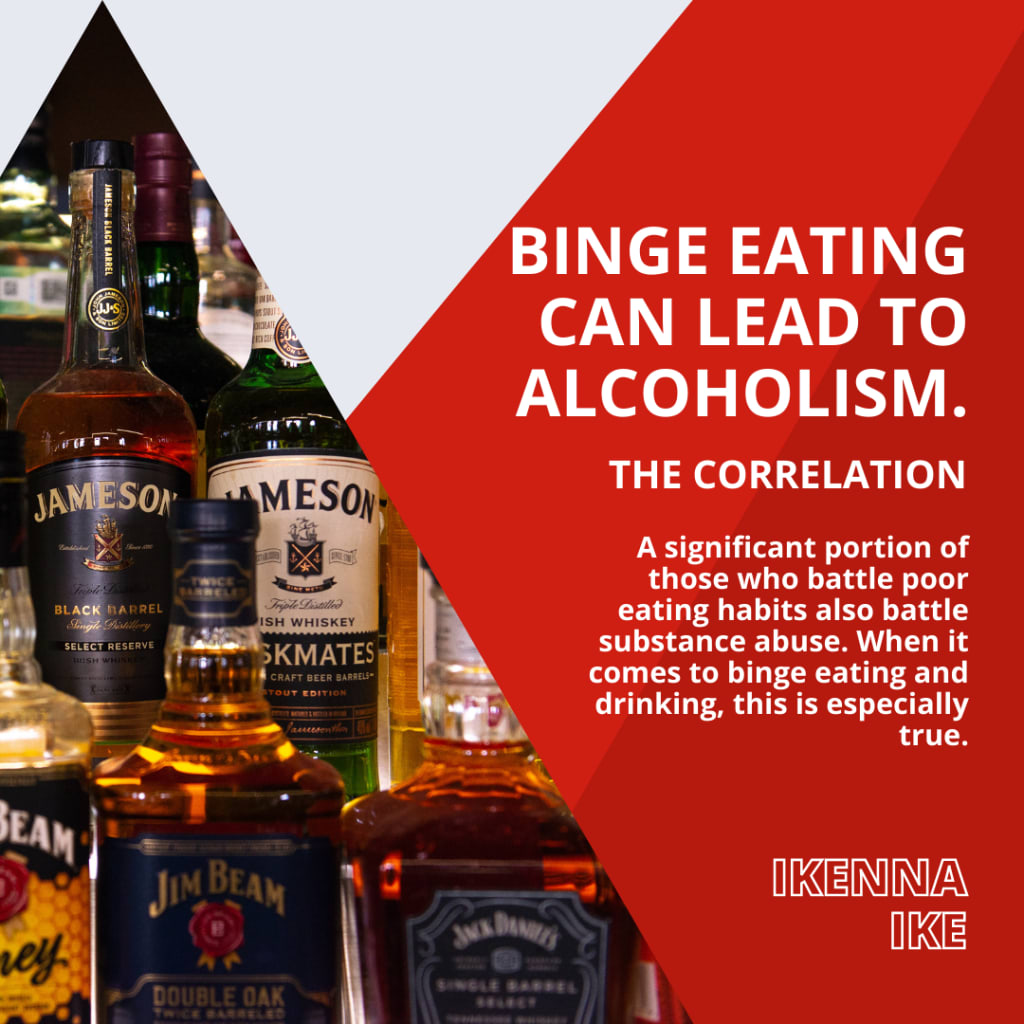Ikenna Ike- Binge eating can lead to alcoholism.
The correlation.

A significant portion of those who battle poor eating habits also battle substance abuse. When it comes to binge eating and drinking, this is especially true.
Research suggests that the high likelihood of comorbidity, or the co-occurrence of these two diseases, may be caused by a combination of shared genetics, impulsive qualities, and a desire to avoid unpleasant experiences.
Living with these things, however, is very different from comprehending them from a scientific perspective. When eating disorders and drug use disorders coexist, it may take a prolonged, well coordinated effort to separate oneself from these destructive ways of thinking.
The idea of binging is one of the main similarities between binge eating disorder (BED) and substance use disorder (SUD).
Both eating and drinking are commonplace. However, bingeing on these narcotics is something else.
Binging episodes are brief, intense, frequently involve excessive activities, and are frequently accompanied by a lack of control.
When it comes to eating food and drinking alcohol, this trend is evident.
Any substance can cause neurological alterations and chemical dependency in the brain when binged on repeatedly. The relationships between the factors influencing behavior and the behavior itself become more complicated and entangled once these adaptations have taken place.
However, there are several shared characteristics that can increase a person's chance of developing both alcohol use disorder and binge eating disorder.
Both alcoholism and binge eating have been shown to be genetically heritable, which means that the disorders may be passed down and frequently run in families. That is as a result of the fact that they function along comparable neural networks in the brain.
Any kind of binging typically affects and is affected by the brains' reward center'. When the body carries out specific actions or absorbs specific substances, this collection of neural pathways is in charge of transmitting particular "feel good" chemicals.
A person's sensitivity to these substances, dysfunction along this pathway, or other features of their neurological development can all be caused by genetic factors, which increases their chance of engaging in binge eating behaviors or developing a dependency.
The ability to manage impulses is strongly influenced by genetics, just like the potential to get addicted. A lack of impulse control is yet another trait that all individuals with disordered eating and drinking patterns have in common.
Any form of illness can emerge, and doing so depends on a variety of interrelated circumstances. But having difficulties controlling one's impulses may be what makes someone binge more frequently or readily, which can afterwards raise the likelihood of them being addicted to anything or developing a disorder.
The impression of being out of control or "trance-like" state that many people associate with bingeing episodes and impulse control are likely related.
Binge eating and alcohol use may support one another in different ways in addition to sharing a number of risk factors.
Some research looking at the relationship between binge eating and binge drinking discovered that binge eating was the main cause of binge drinking, while others discovered the opposite.
It is understood that alcohol, despite having a high caloric content, can increase the brain's chemical signals for extreme hunger. This may help to explain why so many drinkers end up at a diner or raiding the refrigerator the next day, but it may also act as a possible trigger for someone who has problems with binge eating habits.
However, other rat experiments shown that those who engaged in binge eating behaviors were more likely to drink alcohol afterwards.
Although BED and AUD sufferers commonly struggle with impulse control, alcohol can further reduce inhibitions, making bingeing episodes more intense or frequent.
Numerous BED sufferers often diet or seek to reduce their caloric intake by missing meals. These people may skip meals in favor of drinking alcohol, but this can make people gain weight, which may serve to reinforce their disordered attitudes around food and eating.
People who battle with both problems frequently also experience shame, despair, anxiety, and low self esteem. The disordered behaviors associated with each ailment are frequently driven by these sensations, which can be chronic in many circumstances.
For instance, someone might resort to eat for solace after feeling bad about how much they drank, or vice versa.
It's critical to seek therapy for both binge eating and binge drinking if you struggle with either behavior.
Unfortunately, this can be challenging because many eating disorder treatment programs screen for AUD, while alcohol rehab institutions frequently lack eating problem focused therapy.
Nevertheless, addressing both of these problems is the greatest approach to guarantee a long-lasting recovery because one of them might cause or contribute to the other.
A psychologist, psychiatrist, or other medical professional can help you find the help you need if you or someone you know are struggling with any of these issues.
About the Creator
Ikenna Ike
Hello, I am a fun person and I like to write about various topics that I am passionate about, such as sports such as basketball, American football, and other topics such as music or news.






Comments
There are no comments for this story
Be the first to respond and start the conversation.